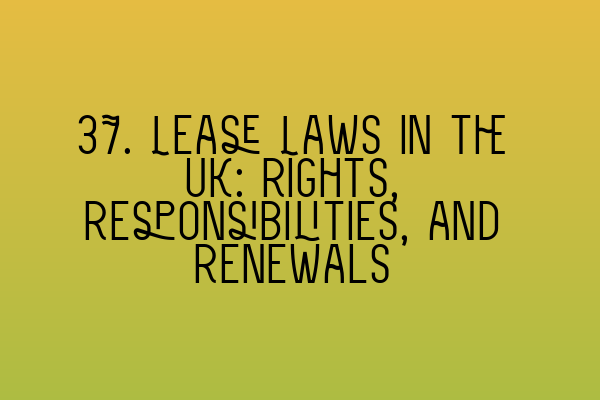Lease Laws in the UK: Rights, Responsibilities, and Renewals
Lease laws in the UK play a crucial role in governing the rights and responsibilities of both landlords and tenants. Whether you’re a property owner, a tenant, or a solicitor specializing in property law, it’s important to have a firm understanding of lease laws to ensure both parties are protected and well-informed throughout the lease agreement.
Understanding Lease Laws
Lease laws cover a wide range of legal aspects associated with renting or leasing a property. From the initial negotiation and drafting of the lease agreement to the rights and responsibilities during the tenancy period, lease laws provide a framework for both landlords and tenants to abide by.
When entering into a lease agreement, it’s essential to understand the key terms and conditions outlined in the contract. This includes the duration of the lease, the rent amount, any special provisions or restrictions, and the responsibilities of both the landlord and tenant. By having a clear understanding of the lease terms, potential disputes and misunderstandings can be avoided.
Rights and Responsibilities of Landlords
Landlords in the UK have specific rights and responsibilities that they must uphold during the tenancy period. It is the landlord’s responsibility to ensure the property is in a safe and habitable condition, complying with all relevant health and safety regulations. Additionally, landlords are required to make any necessary repairs or maintenance to keep the property in a good state of repair.
Landlords also have the right to collect rent from their tenants on time and to take legal action if the tenant fails to pay. However, landlords must follow the proper legal procedures to evict a tenant or take any action against them. It’s crucial for landlords to be aware of the eviction process and the laws surrounding it to avoid any potential legal implications.
Rights and Responsibilities of Tenants
Tenants in the UK are afforded certain rights and protections under lease laws. One of the most important rights of tenants is the right to live in a safe and habitable property. If there are any issues with the property that affect the tenant’s health or safety, the landlord must address them promptly.
Tenants also have the responsibility to pay their rent on time and to keep the property in a reasonably clean and tidy condition. In some cases, tenants may need to seek the landlord’s permission to make alterations or modifications to the property. It’s important for tenants to communicate with their landlord and maintain a good working relationship throughout the tenancy.
Lease Renewals
When a lease reaches its end, both the landlord and tenant have the option to renew the lease agreement. Lease renewals can be a straightforward process, but it’s important for both parties to understand their rights and responsibilities during this time.
If a tenant wishes to renew their lease, they should communicate their intentions to the landlord well in advance. Landlords have the right to consider other options, but they must provide proper notice if they don’t wish to renew the lease.
During the lease renewal process, it’s an excellent opportunity for landlords and tenants to review and update the terms of the lease agreement. This may include adjusting the rent amount or addressing any changes in responsibilities or conditions.
Seeking Legal Advice
Lease laws in the UK can be complex, and it’s always advisable to seek legal advice from a qualified solicitor specializing in property law. They can provide guidance on lease agreements, rights and responsibilities, and help resolve any disputes that may arise between landlords and tenants.
If you’re looking to become a solicitor specializing in property law, it’s essential to have a solid understanding of lease laws. The SQE (Solicitors Qualifying Examination) is the new assessment framework for aspiring solicitors in England and Wales. To prepare for the SQE, you can explore the SQE 1 Practice Exam Questions and SQE 1 Practice Mocks FLK1 FLK2 to enhance your knowledge.
Additionally, there are SQE 2 preparation courses and SQE 1 preparation courses available to help you excel in the SQE exams.
Conclusion
Lease laws in the UK are designed to protect the rights and responsibilities of both landlords and tenants. Understanding the intricacies of lease agreements, rights, and responsibilities is crucial for both parties involved. By familiarizing yourself with lease laws and seeking professional legal advice when needed, you can ensure a smooth and harmonious tenancy experience.
If you have any questions about lease laws or require legal assistance, don’t hesitate to reach out to a solicitor specializing in property law. They will be able to provide expert guidance tailored to your specific circumstances.
For more information on SRA SQE exam dates and requirements, you can refer to the SRA SQE Exam Dates page.
